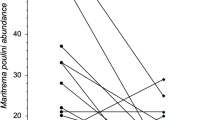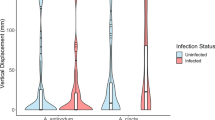Abstract
The extent to which the ability of parasites to alter host behaviour is phylogenetically inherited as opposed to independently evolved has received little attention. We investigated the impact of an undescribed species of Microphallus on the behaviour and survival of its host, the freshwater isopod Austridotea annectens, to determine if it produced effects comparable to those induced by other trematodes of this genus. There was no difference between the vertical distribution and responses to light of infected isopods and those of uninfected isopods. In contrast, we found that infected isopods were more active swimmers than uninfected isopods, and that they failed to show the evasive responses shown by uninfected isopods when exposed to a simulated predator. There was no detectable effect of Microphallus infection on isopod survival, however. Overall, our results provide no strong evidence that the behavioural manipulation shown by our Microphallus species and that displayed by the well-studied Microphallus papillorobustus are inherited from a common ancestor rather than independently derived.


Similar content being viewed by others
References
Combes C (2001) Parasitism: the ecology and evolution of intimate interactions. University of Chicago Press, Chicago
Fredensborg BL, Mouritsen KN, Poulin R (2004) Intensity-dependent mortality of Paracalliope novizealandiae (Amphipoda: Crustacea) infected by a trematode: experimental infections and field observations. J Exp Mar Biol Ecol 311:253–265
Hechtel LT, Johnson CL, Juliano SA (1993) Modification of antipredator behavior of Caecidotea intermedius by its parasite Acanthocephalus dirus. Ecology 74:710–713
Helluy S (1983) Relations hôtes-parasites du trématode Microphallus papillorobustus (Rankin 1940). II. Modifications du comportement des Gammarus hôtes intermédiaires et localisation des métacercaires. Ann Parasitol Hum Comp 58:1–17
Helluy S, Thomas F (2003) Effects of Microphallus papillorobustus (Platyhelminthes, Trematoda) on serotonergic immunoreactivity and neuronal architecture of the brain of Gammarus insensibilis (Crustacea, Amphipoda). Proc R Soc Lond B 270:563–568
Khan RN, Spiers JA, Pung OJ (2003) Effects of the trematode Microphallus turgidus on locomotion and prey capture in the grass shrimp Palaemonetes pugio. J Helminthol 77:327–330
Kunz AK, Pung OJ (2004) Effects of Microphallus turgidus (Trematoda: Microphallidae) on the predation, behavior, and swimming stamina of the grass shrimp Palaemonetes pugio. J Parasitol 90:441–445
Levri EP (1999) Parasite-induced change in host behavior of a freshwater snail: parasitic manipulation or byproduct of infection? Behav Ecol 10:234–241
Levri EP, Fisher LM (2000) The effect of a trematode parasite (Microphallus sp.) on the response of the freshwater snail Potamopyrgus antipodarum to light and gravity. Behaviour 137:1141–1151
Meissner K, Bick A (1999) Mortality of Corophium volutator (Amphipoda) caused by infestation with Maritrema subdolum (Digenea, Microphallidae): laboratory studies. Dis Aquat Org 35:47–52
Moore J (1983) Responses of an avian predator and its isopod prey to an acanthocephalan parasite. Ecology 64:1000–1015
Moore J (1984) Altered behavioral responses in intermediate hosts: an acanthocephalan parasite strategy. Am Nat 123:572–577
Moore J (2002) Parasites and the behavior of animals. Oxford University Press, Oxford
Moore J, Gotelli NJ (1990) A phylogenetic perspective on the evolution of altered host behaviours: a critical look at the manipulation hypothesis. In: Barnard CJ, Behnke JM (eds) Parasitism and host behaviour. Taylor & Francis, London, pp 193–233
Moore J, Gotelli NJ (1996) Evolutionary patterns of altered behavior and susceptibility in parasitized hosts. Evolution 50:807–819
Poulin R (1995) Adaptive changes in the behaviour of parasitized animals: a critical review. Int J Parasitol 25:1371–1383
Poulin R (1998) Evolutionary ecology of parasites: from individuals to communities. Chapman & Hall, London
Poulin R, Curtis MA, Rau ME (1992) Effects of Eubothrium salvelini (Cestoda) on the behaviour of Cyclops vernalis (Copepoda) and its susceptibility to fish predators. Parasitology 105:265–271
Pung OJ, Khan RN, Vives SP, Walker CB (2002) Prevalence, geographic distribution, and fitness effects of Microphallus turgidus (Trematoda : Microphallidae) in grass shrimp (Palaemonetes spp.) from coastal Georgia. J Parasitol 88:89–92
Thomas F, Renaud F, Rousset F, Cézilly F, de Meeüs T (1995) Differential mortality of two closely related host species induced by one parasite. Proc R Soc Lond B 260:349–352
Thomas F, Renaud F, Cézilly F (1996) Assortative pairing by parasitic prevalence in Gammarus insensibilis (Amphipoda): patterns and processes. Anim Behav 52:683–690
Urdal K, Tierney JF, Jakobsen PJ (1995) The tapeworm Schistocephalus solidus alters the activity and response, but not the predation susceptibility of infected copepods. J Parasitol 81:330–333
Acknowledgements
This work was partially funded by a grant from the Marsden Fund, and it follows the guidelines of the University of Otago’s Animal Ethics Committee.
Author information
Authors and Affiliations
Corresponding author
Rights and permissions
About this article
Cite this article
Hansen, E.K., Poulin, R. Impact of a microphallid trematode on the behaviour and survival of its isopod intermediate host: phylogenetic inheritance?. Parasitol Res 97, 242–246 (2005). https://doi.org/10.1007/s00436-005-1435-2
Received:
Accepted:
Published:
Issue Date:
DOI: https://doi.org/10.1007/s00436-005-1435-2




